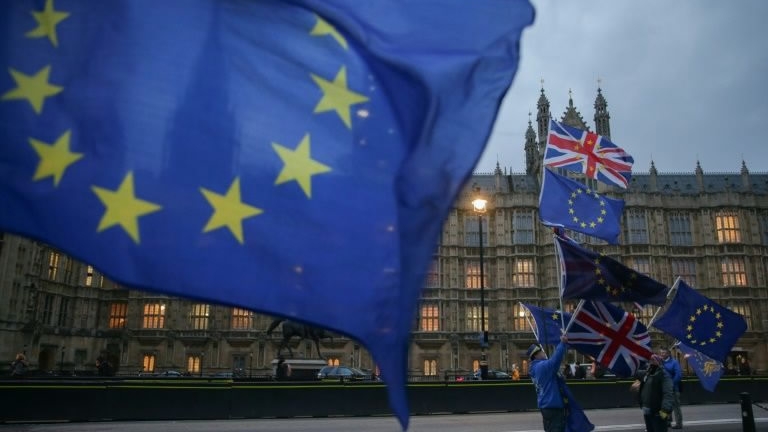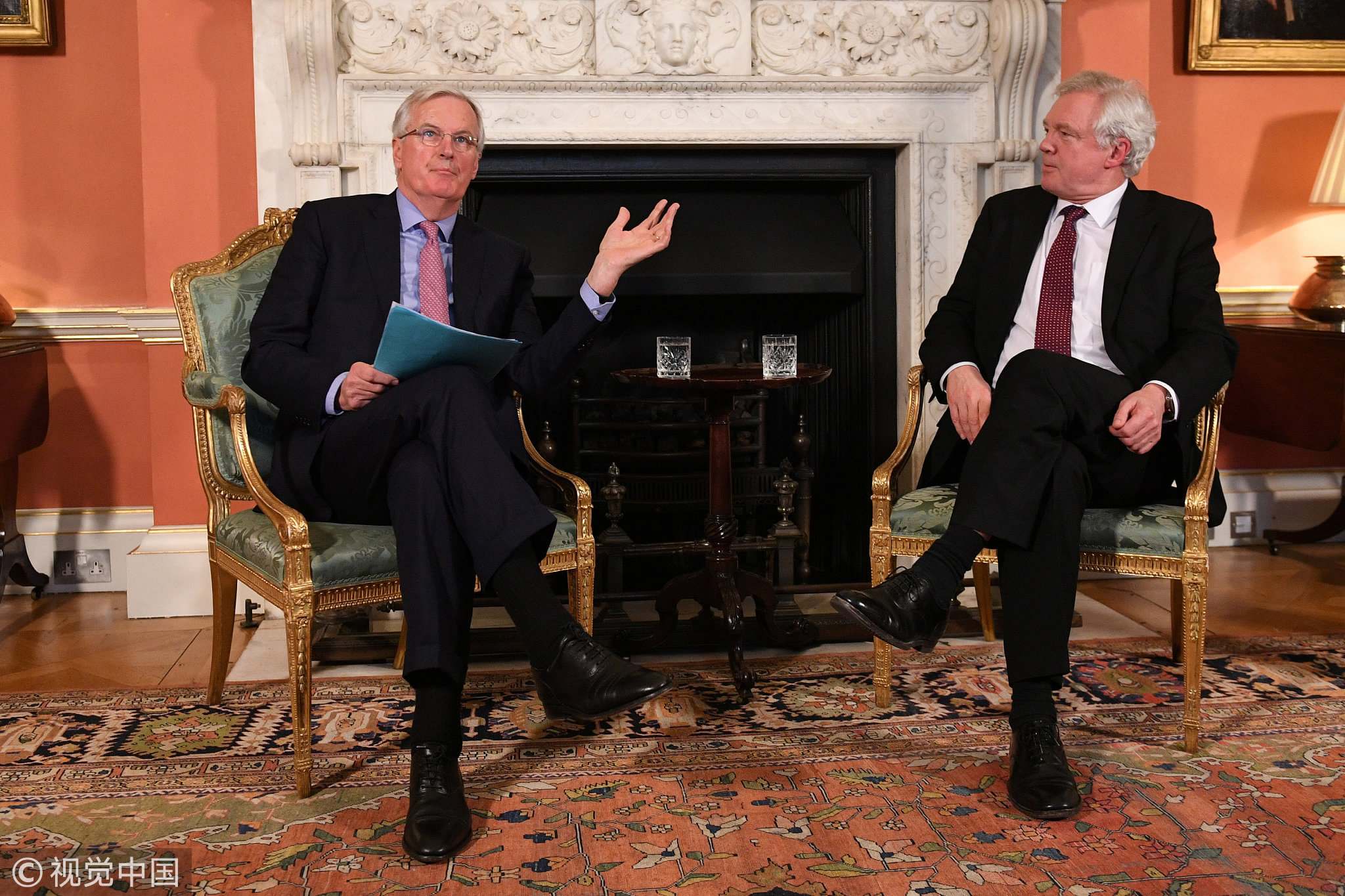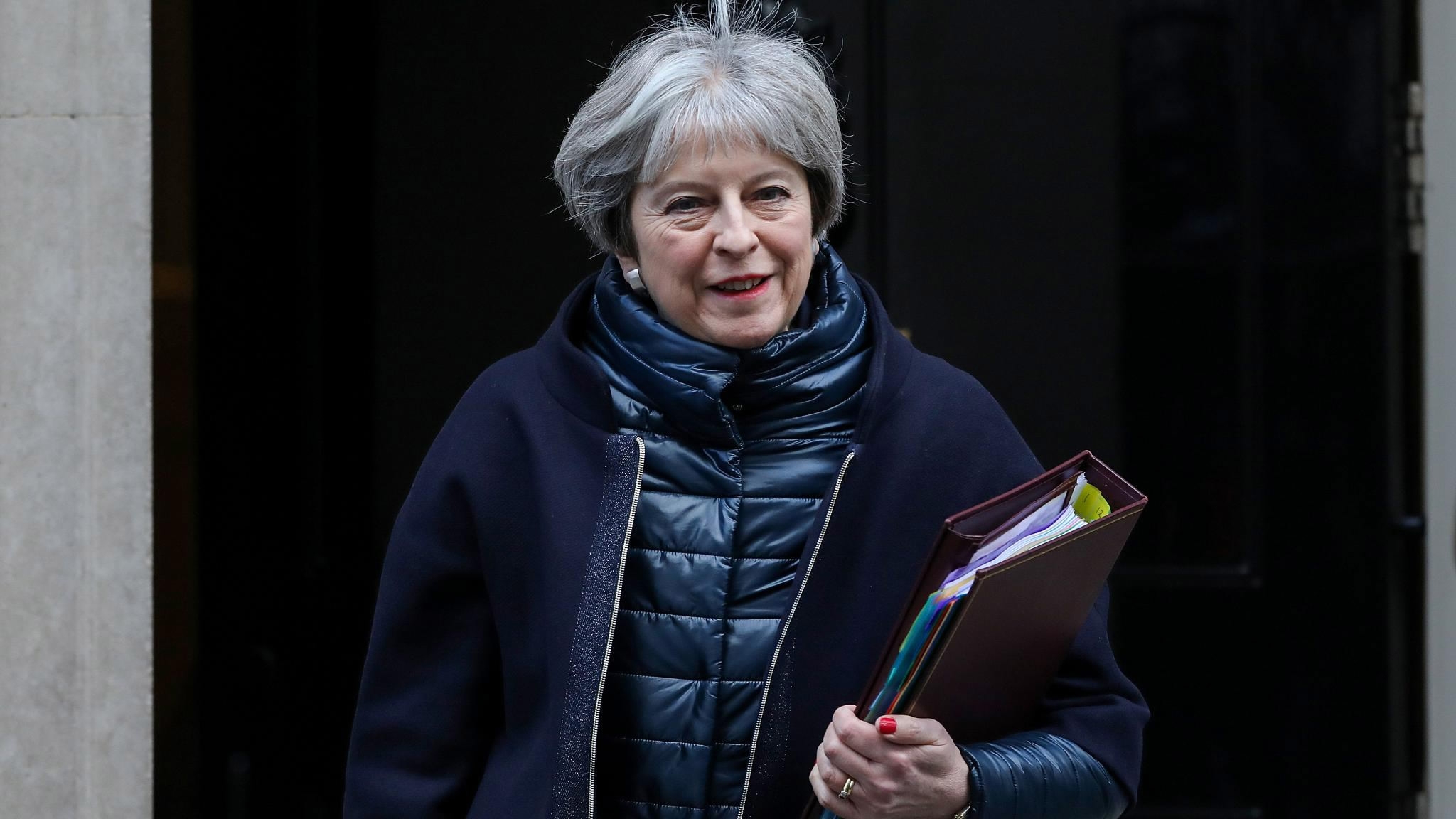
Politics
21:25, 07-Feb-2018
EU defends sanctions against Brexit 'foul play'
CGTN

The EU defended on Wednesday a plan to sanction Britain if it breaks the rules of the post-Brexit transition period, saying it needed to be able to act against any "foul play" by London.
British pro-Brexit lawmakers reacted angrily against "threats" from Brussels after the European Commission published a draft agreement for the nearly two-year transition phase.
It calls for the remaining 27 EU states to have the ability to curb Britain's access to the single market, possibly reintroducing trade tariffs and customs checks, if it breaches the terms of the agreement.
But Stefaan De Rynck, the adviser to EU Brexit negotiator Michel Barnier, insisted it was standard practice to have possible punishments when an international agreement is broken.

Britain's Secretary of State for Exiting the EU David Davis and the EU's chief Brexit negotiator Michel Barnier speak inside 10 Downing Street, London, Feb. 5, 2018. /VCG Photo
Britain's Secretary of State for Exiting the EU David Davis and the EU's chief Brexit negotiator Michel Barnier speak inside 10 Downing Street, London, Feb. 5, 2018. /VCG Photo
"The EU responds to PM (Theresa) May's request to benefit from single market and customs union for a limited time during which all must play by the same rules," De Rynck tweeted.
"Foreseeing possibility of sanctions for foul play is of course part of any agreement."
'Suspend certain benefits'
Britain and the EU began talks this week on the transition, which Brussels says should last for 21 months from the day Britain leaves the bloc on March 29, 2019, until December 31, 2020.
During that period it says Britain must follow all EU laws without having any decision-making powers, in exchange for frictionless access to the single market and customs union enjoyed by the remaining 27 member states.

UK Prime Minister Theresa May departs 10 Downing Street to attend a weekly questions and answers session in Parliament in London, Jan. 10, 2018. /VCG Photo
UK Prime Minister Theresa May departs 10 Downing Street to attend a weekly questions and answers session in Parliament in London, Jan. 10, 2018. /VCG Photo
But the EU's draft, in the final footnote on the last page of the five-page document, calls for the ability to sanction Britain in cases where it would take too long to refer a breach of the transition rules to the European Court of Justice.
"The withdrawal agreement should provide for a mechanism allowing the Union to suspend certain benefits deriving for the United Kingdom from participation in the internal market where it considers that referring the matter to the Court of Justice of the European Union would not bring in appropriate time the necessary remedies," it says.
The draft transition agreement also says that Britain must avoid any actions that are "likely to be prejudicial" to the European Union's interests during the transition.
It sets out the "exceptional" cases where a British representative might be able to sit in on EU meetings.
'Thank heavens we're leaving'
Pro-Brexit lawmakers jumped on the plans, saying it would be "utterly perverse" of the EU to impose tariffs on British goods when the two economies are so closely aligned.
"This is an indication of how fearful the EU is that they have to make these silly threats," senior lawmaker Bernard Jenkin, from Prime Minister Theresa May's Conservative Party, told BBC radio.
"Of course we are going to do rather well outside the EU and we are going to show the EU up as a rather less successful organization than it is."
Influential Conservative MP Jacob Rees-Mogg, billed as a possible leadership rival to May, said the British government would find it "very difficult" to agree with.
"Thank heavens we are leaving an organization that takes such an aggressive stance when you don't do what you are told," he was quoted as saying by The Times newspaper.
Britain did not say whether it would accept Brussels' proposal, or if the government had come up with contingency plans if Britain is blocked from the single market during the transition period.
"This is a draft document produced by the EU that simply reflects their stated directives," a Brexit ministry spokesman told AFP.
The two sides hope to reach agreement on a transition by the end of March so they can move on to talks on the future EU-UK relationship, including the outline of a possible trade deal.
The two sides reached an interim deal in December on three key separation issues: the financial settlement, the Irish border and the rights of EU citizens after Brexit.
Source(s): AFP

SITEMAP
Copyright © 2018 CGTN. Beijing ICP prepared NO.16065310-3
Copyright © 2018 CGTN. Beijing ICP prepared NO.16065310-3